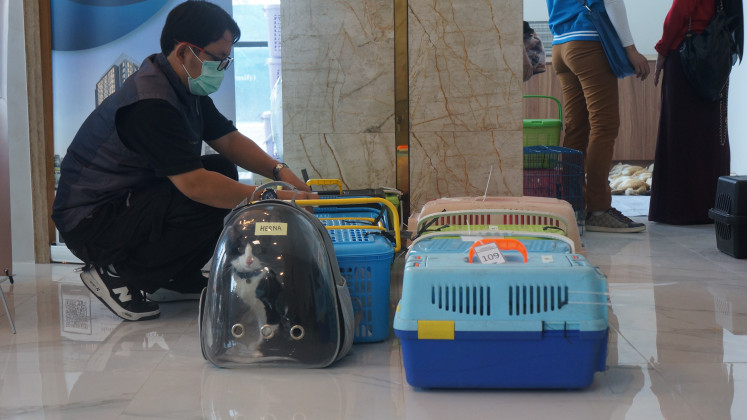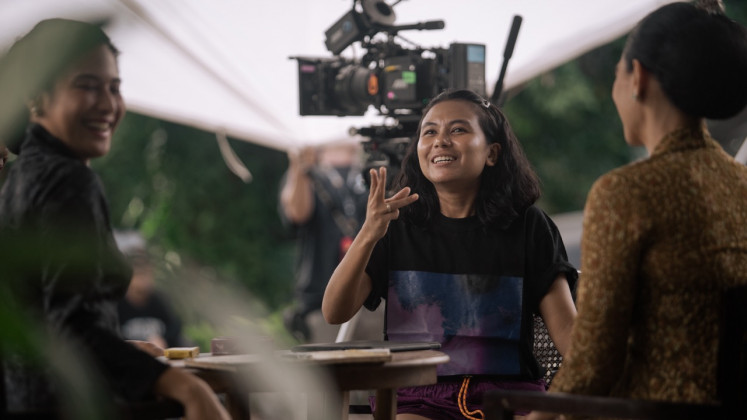Popular Reads
Top Results
Can't find what you're looking for?
View all search resultsPopular Reads
Top Results
Can't find what you're looking for?
View all search resultsAiming the lens at the lives of refugees stuck in Indonesia
Two films focusing on the stories of refugees serve as important documents of a global humanitarian emergency.
Change text size
Gift Premium Articles
to Anyone
I
ndonesia is currently the reluctant home of 14,000 of the roughly 65 million refugees displaced globally, who have fled their homes out of fear of violence, discrimination and persecution by the authorities in their home countries.
While the number of refugees in the world has increased incredibly in the past few years, most developed countries have been lackluster in responding to their pleas and offering them shelter.
While some countries have welcomed thousands of refugees following the 2016 mass exodus, they have learned that it is not easy for them to integrate into a new society. In some countries, clashes and heated, ugly debates on immigration have erupted.
Some have adopted policies to make sure societal disturbances won’t happen from the very start. An unfortunate example of this is the vicious campaign of unlawful detentions by Australia, which is one of the most sought-after destinations for refugees.
These are the uncertain realities facing thousands of refugees stranded in Indonesia, with many scattered across the archipelago and likely to remain where they are for a very long time.
This plight was the subject of two films screened and sponsored by the Goethe Institut at the Refugees Up Close event on July 17th, which aimed the lens at these forgotten people and offered a deeper insight into their lives in Indonesia.
The first film, directed by Adrianus Oetjoe, is titled Respite, which tells the story of several refugees currently stranded in Makassar, South Sulawesi, which has the second-largest refugee population in Indonesia after Medan, North Sumatra.
Filmed in 2017 to 2018, Oetjoe focuses his lens on various lives as they adapt to their fate and their conditions, made worse by inhumane treatment by authorities from the Makassar Immigration Office, and the severe restrictions they have on their livelihoods.
Refugees are not allowed to work or open businesses legally in Indonesia as the country is not legally bound to accept refugees as they are not signatories of the United Nations 1951 Refugee Convention.
As seen in the film, the refugees, who come from places such as Afghanistan, Iraq, Sri Lanka, Syria and Myanmar, talk about how they are given a strict curfew and are usually severely punished when they break it.
Their interactions with the locals, however, are friendly. The refugees kill time by mingling with the local community, playing sports, hanging out or maybe choosing a more reserved activity such as tending pigeons. The people of Makassar themselves are portrayed as welcoming to the refugees and do express genuine sympathy.
Respite was the sadder film of the night, as it includes some heartbreaking scenes involving the refugees. In one such scene, an Afghan refugee named Yama reads some news on his phone about a 22-year-old Afghan man, who apparently came from the same village as he did, who committed suicide in the Makassar refugee detention centre after simply giving up hope.
“Hope is all we have in this uncertainty. If we lose it, then we lose,” Yama says.
In a film that is teeming with heartbreak, the most significant scene is probably the one in which Yama tells Oetjoe about the time United Nations Refugee Agency (UNHCR) staff visited the detention center and told the dozens of refugees that there was no way they could be resettled.
“They told us instead that it’s better for us to go back to our home countries, because there was absolutely no chance that countries like Australia or the United States would accept refugees waiting in Indonesia,” he says.
“Well, we can’t. The reason we fled our homes is because it is no longer safe to live there. If we can’t leave Indonesia that’s fine, as the people here are very welcoming to us. All we want is for the government to allow us to work and not just keep us caged in one place so that we are able to contribute to this society that we have grown to love,” Yama adds.
Meanwhile, the second film of the night created a more positive and light atmosphere despite also dealing with relatively tragic subject matter.
Performing Out of Limbo, a film made by a collective of anthropology students and researchers from the University of Indonesia (UI), tells the story of two Ethiopian refugees who fled their country fearing ethnic persecution against their tribe, the Oromo, which has been carried out by Ethiopia’s central government in recent years.
The two men, Hamza and Allamudin “Alex”, fled their country separately after being targeted by the authorities when they were accused of organizing and participating in peaceful Oromo-led protests against the government’s constant taking of their ancestral lands.
As the men reached Indonesia and applied for refugee status at the local UNHCR office in Jakarta, they connected with each other and became friends, sharing a love for making music.
Starting out rapping and singing Oromo lyrics to free template songs, they eventually made friends with the anthropology researchers at the UI that initially studied them and quickly expanded their circle of friends through them.
They would soon be in contact with studio engineers and began playing together in campus shows, most significantly at a World Refugee Day event at the university in 2017. Their music even came to the attention of members of Indonesian rock band Gigi, who jammed out a song with Alex and Hamza at the end of the film.
The songs that both men wrote were sung in their native Ethiopian Oromo dialect, and their content was mainly about typical Oromo lyrical subjects as love and freedom.
A rather amusing song that Hamza composed was called “Pondok Cina”, named after the train station nearest to the UI campus in Depok, West Java, which he said was the first place he set foot in Jakarta. The song is, however, about an Indonesian girl he met at the station.
You cannot blame them for their cheeky demeanor throughout the film and in their music. Both men ooze charm, and the personal connection the two men forged with the university community has helped them understand the culture and reality of Ethiopia even better.
“People don’t necessarily have to understand the lyrics. They can just feel the soul,” says subject Candra Winako in the film.
With all this said, it is not yet known when these two films will be available to the public as the filmmakers have raised concerns regarding the possible liability involved for the refugees featured in the film or the people and institutions involved.









